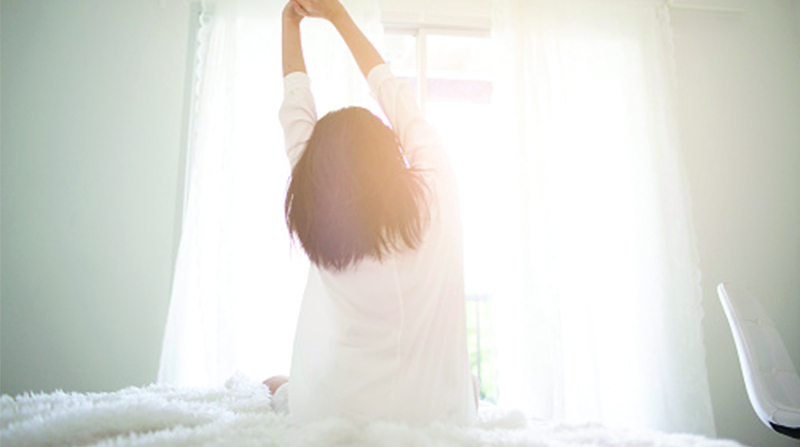Anita’s wake-up call came moments after she dropped her children off at school and was jarred awake by her car scraping against a stationary car. She had dozed off at the wheel! It was at this point Anita reached out to IMI for help.
“I struggled with sleep issues for many years but I refused to take sleeping pills prescribed by doctors and I didn’t benefit from over-the-counter sleep aides. When l momentarily lost control of my car I realised I needed to make sleep a priority. A naturopath at IMI helped me identify and address multiple sleep-disruptors and as a result I now sleep better, and this has benefitted me in so many ways,” says the mother-of-three who chose to share her story to highlight the dark side of sleep deprivation.
In our modern-day world, sleep is elusive to many. We’re in the middle of a sleep epidemic. The great playwright William Shakespeare called sleep “the chief nourisher in life’s feast.” In his time, people generally managed nine hours of shut-eye per night. But in today’s post-electric, digital era, we’re getting between six or seven hours on average. We’re so switched on, it’s now difficult to switch off.
Switching off at night is essential for the proper functioning of our bodies and minds. Poor sleep impacts our energy, concentration and immune system function. It increases our stress levels, the risk of chronic disease, tendencies to reach for unhealthy food choices, and more.
Some people turn to prescription sleep pills, which provide temporary respite but sleeping medicines don’t address the real reasons for restless nights and they come with significant risks and side effects.
You don’t need to go through life in a permanent state of exhaustion and you don’t need to pop pills. Here are some tried and tested solutions to help you sleep tight, naturally.
Nourishing herbs and nutrients
You’ve created a sleep sanctuary and you’ve implemented a healthy bedtime routine but yet, you still can’t nod off! Supplements such as melatonin and its precursors L-5-hydroxytryptophan (5-HTP) can help you fall asleep. 5-HTP is especially beneficial if you’re prone to low mood.
“Bear in mind that these supplements can help you fall asleep, but they won’t help you stay asleep,” says naturopath, homeopath, and IMI’s Founding Director Graeme Bradshaw.
“Melatonin only helps those who have trouble falling asleep; it doesn’t keep you asleep all night or help those who wake up early. It is also not recommended for stress-related sleep problems,” he advises.
As adrenal stress can contribute to or exacerbate sleep problems, Graeme recommends having your adrenal glands checked. Taking a supplement like magnesium or ashwagandha can help reduce your stress levels for better sleep.
Counselling and psychotherapy – when sleeping problems become chronic
When sleepless nights go on for longer than one month, the problem is considered chronic. At this point, it is important to determine the underlying issues that are impacting your sleep.
Primary causes of sleeplessness, e.g. bereavement, loss of a relationship, a job, or a traumatic life event – are known as adjustment disorders and often impact our sleep. “When the body and mind are overstimulated, our brains are flooded with neurochemicals, such as adrenaline and eninephrine, which physiologically interrupt the normal sleep cycle. Stress, worry, anxiety, current and early trauma can all further perpetuate this cycle and keep you up at night,” says Carole Bradshaw, IMI Director and psychotherapist.
Secondary causes of sleep issues can include medical illness, psychiatric disorders, environmental, lifestyle and sleep hygiene factors.
A trained psychologist, psychotherapist or counsellor can help you recognise the underlying stressors and support deeper healing, particularly if sleep has been disrupted through a difficult event or trauma. They can also help you re-establish healthier and more nourishing routines, especially before bed-time. By supporting your body, mind, nervous system and environment, peaceful sleep can become your reality.
Complementary Therapies
There’s a range of natural treatments and complementary therapies that can help you enjoy sound sleep. Here’s a handful that has worked for our clients:
Acupuncture: From a Traditional Chinese Medicine perspective, sleeplessness indicates an imbalance of various organs, which affect the heart. These points are known as the ‘houses’ of the shen (spirit). Gianna Buonocore, our TCM practitioner, has helped clients sleep well with acupuncture and Chinese herbs.
Osteopathy and Craniosacral therapy: Structural faults in the neck vertebrae or cranial plates are common causes of sleep problems. Our osteopaths have had great success in identifying issues and providing the appropriate adjustments or gentle release. Cranio-osteopathy or Craniosacral therapy is particularly effective for sleep-related issues and relieving the accumulation of tensions.
Craniosacral and Bowen therapies: Working on physical, emotional, mental and subtle energy levels, craniosacral and Bowen therapies help rebalance and restore the overall system. Craniosacral therapy is particularly helpful for encouraging the parasympathetic nervous system. These therapies also relieve tensions on the dura matter in the cranium, increasing the effectiveness of the pituitary gland and pineal gland, which in turn releases melatonin to help you sleep better.
Bach flower remedies: These remedies help you pinpoint the underlying emotions that are directly impacting your health and wellness. They allow you to gently restore emotional balance by casting out negative emotions that are weighing you down and keeping you up. Fear, worry, frustration, indecision, and more.
Reflexology, Reiki, crystal healing, and BodyTalk have also helped clients embrace quality sleep.
Can we find the right sleep solution for your individual needs?
Yes, we can. We can demystify your sleep issues and create sustainable solutions tailored to your individual circumstances.
To book a consultation, call 2523 7121 or connect with us here.
Not sure where to start? We offer a free, no-obligation Integral Health Signposting Service. Based on your individual sleep needs, our experienced health advisors will be happy to connect you to the most appropriate practitioner and service.
(Our client’s name has been changed to protect her privacy.)



